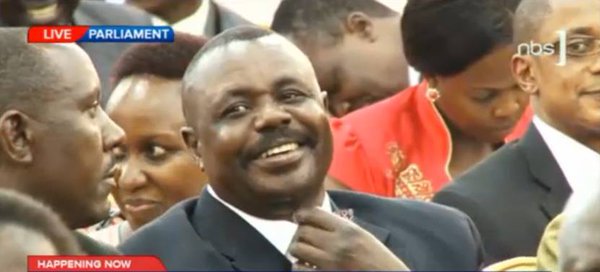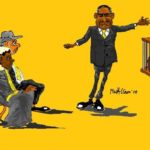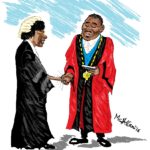If he was a movie Director, he would be the brains behind a successful film, ‘The Return of Oulanyah’, a Ugawood blockbuster shot and directed in Uganda by Jacob Oulanyah L’Okori for about 20 years between 1991 and 2016.
Since Oulanyah shot to fame in Ugandan politics, his name has been synonymous with interesting tales: a mixture of candidness, political shrewdness and the ability to navigate difficult terrain, things that have seen him rise to the Number Six position in the country.
To many who follow politics in Uganda, Oulanyah’s political home is the Uganda Peoples Congress (UPC), and he first joined national politics by contesting for and winning the Omoro County seat in 2001 on the UPC ticket.
In fact, in the early 1990s, while still at Makerere University where he was Guild Speaker and the place where he cut his political teeth, Oulanyah was an outspoken critic of the Yoweri Museveni National Resistance Movement/Army (NRM/A) regime, which was then embroiled in a grueling war with Joseph Kony’s Lords Resistance Army (LRA) in his home region of Northern Uganda.
But the 51-year old lawyer’s political fortunes were to change with his election as chair of the Parliamentary and Legal Affairs Committee of the Seventh Parliament, the ensemble that was instrumental in the scrapping of the then mandatory two-5 year term limit, a development that paved the way for NRM’s President Yoweri Museveni to seek a third term in 2006. Oulanyah later tactfully decamped to the ruling party.
But since he joined the National Resistance Movement in July 2006 Oulanyah has earned himself as many Ugandan friends as has earned foes, the latter who blame him for President Museveni’s lengthy stay in power that is now supposed to end in 2021.
Political pundits aver that the despite being a staunch UPC candidate contesting for the Omoro seat in the 2006 elections, his role in the removal of term limits in 2005 endeared Oulanyah to Mr Museveni, but also cost the former his Omoro seat because his constituents considered him a sellout.
However, like the proverbial cat with nine lives, Oulanyah was to make a strong political comeback in the March 2011 elections and was in turn reportedly rewarded with the post of Deputy Speaker of the Ninth Parliament in 2011.
But his term as Deputy Speaker in the previous Parliament has not been a rollercoaster; he has had a brazenly tumultuous working relationship with his boss Rebecca Kadaga that culminated in strong blob tongue-twisters in the public domain.
But interestingly, it is this somewhat funny working relationship with Speaker Kadaga and the charm effect developed over the last 10 years with Mr Museveni and the National Resistance Movement (NRM) party that almost thrust him into the Number Three position, the Speaker of Uganda.
But this was not before the Oulanyah being accused of failing the interests of the Ugandan public in the way he handled parliamentary affairs in regard to the Public Order and Management Bill (POMB), which was later passed into an Act (POMA); the Petroleum (Exploration, Development and Production) Act, 2012 and the stand off between President Museveni/Executive and Parliament following the death of Butaleja Woman Member of Parliament Cerinah Nebanda.
Without delving in the nitty-gritty, in the minds of several Ugandans, in all the above issues Oulanyah acted as an ‘extension of the Executive’, raising queries about his suitability as a people’s representative in the Parliament of Uganda, whose principal duties are to make reasonable laws and to hold the Executive accountable.
It is against such a background that Ugandans are now questioning why the Executive fought so hard to see that Oulanyah, after having failed to floor Kadaga in the race for speakership, still becomes Deputy Speaker.
Indeed, fingers are pointing to electoral reforms, with a possible removal of the Constitutional age limit of 75, as one of the reasons the Executive was hell-bent on Oulanyah remaining as one of those to steer the House, should the need arise.
But that is still a presupposition being fronted by some Ugandans because four years ago in May 2012, Mr Museveni, now aged 72, had reportedly vowed that he would not seek the removal of the age-limit clause.
“After clocking 75, I will not support the lifting of the age limit to allow me contest for another term of office,” Museveni reportedly said while appearing on NTV’s ‘On the Spot’ programme.
But the Constitution is ‘just a paper’ he once reportedly said. And this means changing the Constitution is not rocket science if one so wishes and has a parliamentary majority whose exhibited penchant for freebies including millions in cash handouts is unrivalled.
Nonetheless, talk doing rounds in town indicates that new Deputy Speaker Jacob Oulanyah is more inclined to toeing a path the will likely favour the wishes of the Executive, should need arise.








